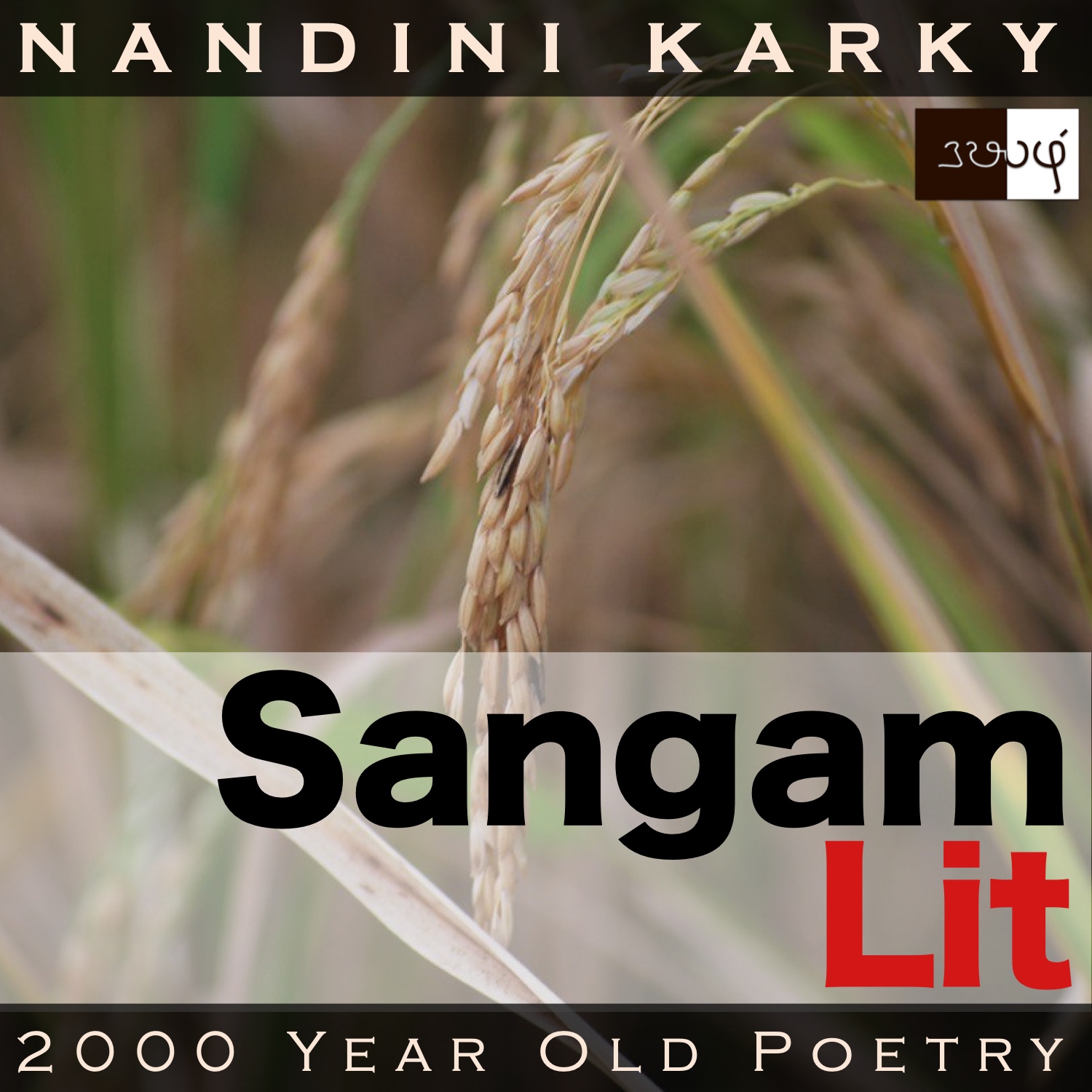Podcast: Play in new window | Download
Subscribe: Apple Podcasts | Spotify | Amazon Music | Android | iHeartRadio | TuneIn | RSS | More

In this episode, we relish the richness of expression, as portrayed in Sangam Literary work, Natrinai 209, penned by Nochi Niyamkilaar. The verse is set in the mountain country of ‘Kurinji’ and speaks in the voice of the man to his heart, intending it to be overheard by the lady’s confidante.
மலை இடம்படுத்துக் கோட்டிய கொல்லைத்
தளி பதம் பெற்ற கான் உழு குறவர்
சில வித்து அகல இட்டென, பல விளைந்து,
இறங்குகுரல் பிறங்கிய ஏனல் உள்ளாள்,
மழலை அம் குறுமகள், மிழலைஅம் தீம் குரல்
கிளியும் தாம் அறிபவ்வே; எனக்கே
படும்கால் பையுள் தீரும்; படாஅது
தவிரும்காலைஆயின், என்
உயிரோடு எல்லாம் உடன் வாங்கும்மே!
The first two lines of the verse read like a lesson from Mountain Farming 101. The phrase ‘மலை இடம்படுத்து’ meaning ‘preparing the mountain land’ packs within, the difficulty of bending the rocky regions of a mountain to man’s intention of rearing crops. No matter how efficiently man works to change that mountain land, nothing will bear fruit until nature decides so. This is captured in the words ‘தளி பதம் பெற்ற கான்’ meaning ‘the field that has been changed by the rains’. The two phrases ‘சில வித்து’ and ‘பல விளைந்து’ meaning ‘few seeds’ and ‘many grains’ hold the core of this verse. When one sees the word ‘மழலை’, the first thing that comes to mind is a baby’s voice. But here, it’s mentioned as an attribute of the ‘குறுமகள்’ or ‘young girl’. Amidst such sweetness, I also learnt a new word for ‘suffering’ in ‘பையுள்’. Let’s explore the story in this bittersweet mountain song!
The man had met the lady in the mountains and had fallen in love with her. After the introduction with the lady, the man understands that for his relationship with her to progress, he needs to win the trust of the lady’s confidante. As the confidante is unaware of their relationship and as she does not know the man well, she refuses to entertain him. The man is pained by this and one day, seeing the confidante pass by, speaking as if to his heart, he says, “Clearing the land in the mountains and fencing it all around, the mountain folk wait for the rains to change the earth to the right consistency and then, they sow in their fields. Seeds few are thrown wide and from these few, many grains bloom, bending the crop ears down. Such is the millet field where the girl resides. She’s a young girl with the sweet lisp of an infant. Parrots hearing that honey-like prattle, understand it well. When those words fall on my ears, my deep misery ends. But, if that eludes me, the moment I miss it, all my abilities and my life fades away!” With these words, the man declares his love for the lady to the confidante and stresses that it would be best if the confidante would help him secure the affections of the lady.
Now, to unearth the rich treasures in this verse! The man first talks about the hard task of preparing the mountain land for farming and then mentions about the patient wait for the rains to change the soil just right for life to bloom. Then, making it clear that it’s not a farming lesson he’s giving, he talks about the people of that region, the mountain dwellers, who sow on this land. And, what do they sow? The man replies, ‘Seeds few’. He then adds, ‘Seeds few indeed but grains many’. So many that the stalk bends with the weight of these grains bearing it down. The man adds that such crops are to be found all over the millet field, where the lady stands guard. The man goes on to describe the lady as one with the voice of an infant and that parrots listening to this talk think that the lady is one of them! The man finishes by saying if he gets to hear that voice, his suffering will cease. If not, all his abilities and his very life would part away from him. And thus, he declares his immense love for the lady and how she’s vital to his very existence.
That was the deeper meaning of the verse but what about the hidden meaning? When the man first talks about the harsh mountain land, perhaps he’s mentioning it as a metaphor for the confidante’s heart, that seems to be unrelenting towards his cause. He then shows he’s prepared to wait in order to persuade the confidante to change her mind. Then comes the vital words about ‘Seeds few and grains many’. This is a request from the man to the confidante to heed the few words from his mouth and help him reap the countless benefits in a long and happy relationship with the lady. Like the man’s words, the poem’s words too are few but within them, they hold such richness that we are able to reap these grains of wisdom and walk away, with that mountain song on our lips!




Share your thoughts...